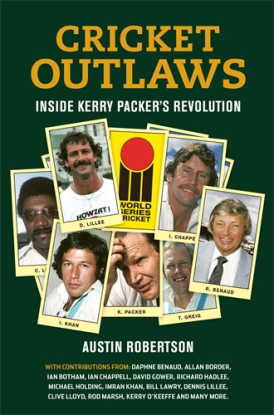Cricket Outlaws
Archie Mac |Published: 2017
Pages: 418
Author: Robertson, Austin
Publisher: Macmillan
Rating: 3.5 stars

2017 marks the 40th anniversary of WSC (World Series Cricket). If you consider that the average player signed by WSC was around 30 years of age in 1977, it doesn’t take a mathematician to calculate that most of those involved are now into their seventies so, perhaps the fact that time is running out to tell their story, is the reason Austin Robertson appears to have had no trouble in convincing almost everyone involved in the venture to put their thoughts down on paper.
Apart from the acceptance of mortality, the previously shy participants may have been more comfortable talking to Robertson, as he was a founder of WSC, a friend of many involved and also manager of some of the players, including Dennis Lillee.
Whatever the reason, Robertson has extracted some fascinating stories and anecdotes out of almost everyone involved. To list even a third of the contributors would take up too much space. The author has spoken to everyone from players, to technicians, to support staff. The only real gaps are those from the establishment cricket board members of the period and some of the dissenting English reporters of the time, such as Henry Blofeld.
The book is set out in an interview style with Robertson providing a brief personal recollection on each contributor. These are well and amusingly written. His summing up of WSC head honcho Kerry Packer is particularly apt. After writing how Packer was misportrayed in the miniseries, Howzat, he writes “but Kerry was also lean, mean, and ruthless in business”.
After the Robertson introduction we hear the participant’s thoughts. There is a big discrepancy between the length of reminiscences. Some contributors write only a page or two, while others pen several. Fame or WSC status does not dictate length, instead it seems to be left to the individual.
This style of storytelling can lead to repetitiveness, however, due to some tight editing this is kept to a minimum. In the end we are left with some great and informative recollections about a defining period of cricket history. People who thought they knew the story of WSC, even those who read Gideon Haigh’s seminal The Cricket War, are in for a treat and information nirvana.
Haigh writes a piece in Cricket Outlaws, which compares the importance of WSC to the other significant events in cricket history, as identified by Ian Chappell; the 1912 sacking of the ‘big six’ and the Bodyline controversy. For the scholarly cricket reader the piece by Haigh really puts WSC into context.
It is never wise to choose favourite pieces from a book with so much quality and such a variety of stories, but I will. John Benaud, who was sports editor of a Sydney newspaper at the time the story of WSC broke in 1977, transports you back to the days of competition for afternoon ‘paper sales’. This was before the time of instant news via Social Media. The new editor was a young Darren Hinch who made the call to go with an American conspiracy over the sacking of Australian Prime Mister Gough Whitlam rather than the leaking of the WSC or ‘Packer Circus’ as it was then referred, as the newspaper’s front page headline.
In the end some of the best anecdotes concern Kerry Packer. Former Australian opening batsman Bruce Francis has some belters, including Packer wanting Francis to put up his family home in a bet. When Francis refused the 500k gamble Packer rang up Tony Grieg, who Francis was managing at the time, and told him to change agents as he (Francis) didn’t have any guts and had blown a 500k windfall. Ian Chappell relays a great anecdote about Richie Benaud too.
If time permitted, it would be easy to relay a hundred memorable and mostly new stories about any number of great personalities from WSC. Instead it is probably best to just tell everyone to go and purchase a copy of Cricket Outlaws, it is a great read.






Leave a comment